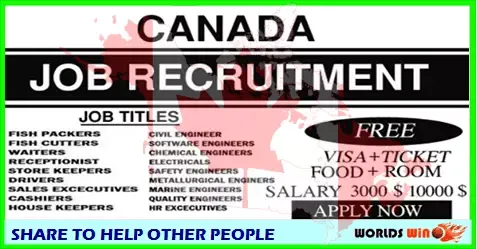Looking for a job in Canada may be like looking for a needle in a straw. Others see that it is easy to find the job opportunities they are looking for. It could be a stroke of luck or something like that. However, personal qualifications, qualifications, experience and skills remain among the important elements for every job seeker.You may find some unfair requirements or you may see them as illogical on the part of some companies or employers, but you still have to write a resume that attracts the employer to be the detail for that position.
Know this over view about Canada to understand
Canada is a country in the northern part of North America. Its ten provinces and three territories extend from the Atlantic to the Pacific and northward into the Arctic Ocean, covering 9.98 million square kilometres (3.85 million square miles), making it the world's second-largest country by total area and the fourth-largest country by land area. Canada's sole border with the United States is the world's longest bi-national land border.
The majority of the country has a cold or severely cold winter climate, but southerly areas are warm in summer. Canada is sparsely populated, the majority of its land territory being dominated by forest and tundra and the Rocky Mountains. It is highly urbanized with 82 per cent of the 35.15 million people concentrated in large and medium-sized cities, many near the southern border.
One third of the population lives in the three largest metropolitan areas:
Toronto, Montreal and Vancouver. Its capital is Ottawa, and other major urban areas include Calgary, Edmonton, Quebec City, Winnipeg and Hamilton.
Canada is a federal parliamentary democracy and a constitutional monarchy, with Queen Elizabeth II being the head of state. The country is officially bilingual at the federal level. It is one of the world's most ethnically diverse and multicultural nations, the product of large-scale immigration from many other countries. Its advanced economy is the eleventh-largest in the world, relying chiefly upon its abundant natural resources and well-developed international trade networks. Canada's long and complex relationship with the United States has had a significant impact on its economy and culture.
Canada is a developed country and has the tenth-highest nominal per capita income globally as well as the ninth-highest ranking in the Human Development Index. It ranks among the highest in international measurements of government transparency, civil liberties, quality of life, economic freedom, and education.
Canada is a realm within the Commonwealth of Nations, a member of the Francophonie, and part of several major international and intergovernmental institutions or groupings including the United Nations, the North Atlantic Treaty Organization, the G7 (formerly G8), the Group of Ten, the G20, the North American Free Trade Agreement and the Asia-Pacific Economic Cooperation forum.
While a variety of theories have been postulated for the etymological origins of Canada, the name is now accepted as coming from the St. Lawrence Iroquoian word kanata, meaning "village" or "settlement". In 1535, indigenous inhabitants of the present-day Quebec City region used the word to direct French explorer Jacques Cartier to the village of Stadacona. Cartier later used the word Canada to refer not only to that particular village, but to the entire area subject to Donnacona (the chief at Stadacona); by 1545, European books and maps had begun referring to this small region along the Saint Lawrence River as Canada.
From the 16th to the early 18th century "Canada" referred to the part of New France that lay along the Saint Lawrence River. In 1791, the area became two British colonies called Upper Canada and Lower Canada collectively named the Canadas; until their union as the British Province of Canada in 1841. Upon Confederation in 1867, Canada was adopted as the legal name for the new country at the London Conference, and the word Dominion was conferred as the country's title.
The transition away from the use of Dominion was formally reflected in 1982 with the passage of the Canada Act, which refers only to Canada. Later that year, the name of the national holiday was changed from Dominion Day to Canada Day. The term Dominion is also used to distinguish the federal government from the provinces, though after the Second World War the term federal had replaced dominion.
required for job seekers

